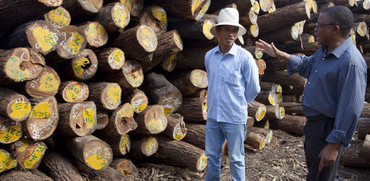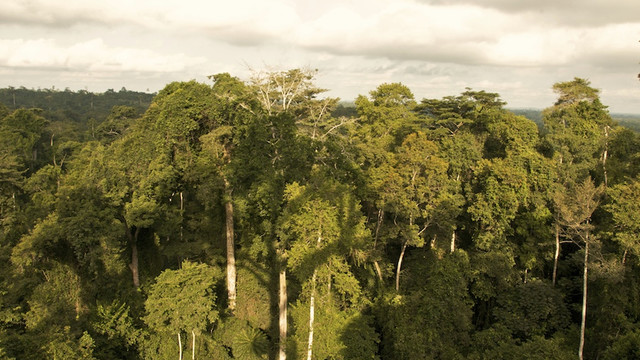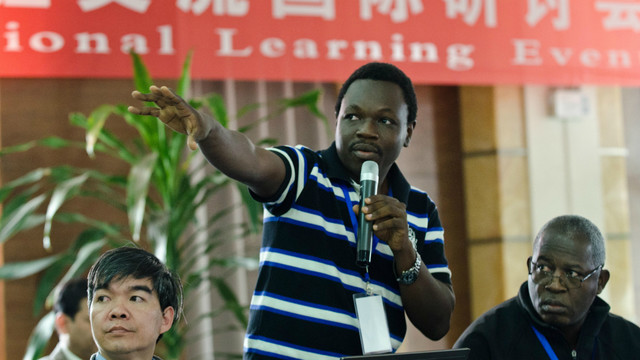New IIED videos inform Chinese consumers about Africa's forests
IIED has released two new films highlighting initiatives to improve the sustainability of Chinese investments in Africa. The films are part of a wider effort to reach Chinese and international audiences with messages about sustainability, good governance and local livelihoods.
This four-minute film, 'Meet Mr Forest', profiles Zheng Fei, founder of the 'Mr Forest' company in Mozambique, and a pioneer of sustainable Chinese investment in the country. The four-minute film was premiered at the Beijing Documentary Week film festival in August 2018.
In the film, Zheng describes how he arrived in Mozambique 15 years ago and “fell in love with the local trees”. Since then, he has built Mr Forest into a successful forestry company.
Mr Zheng is one of many Chinese investors in Africa, many of them small-scale entrepreneurs building businesses exporting African natural resources to China. He is a true pioneer: he has promoted sustainable operating practices, adopted Chinese government guidelines on good forestry, and actively supports local communities in Mozambique. Not all small-scale entrepreneurs, nor big investors, are so astute – but maybe more of them can be persuaded to follow his lead.
Over the last three years IIED and partners have been working with Chinese investors such as Mr Zheng and with African stakeholders to improve the impacts of Chinese businesses in Africa. IIED worked with Mr Zheng to help him expand sustainable working practices and communicate his approach to other investors.
One critical problem in Mozambique is the high rate of deforestation, caused mainly by large-scale logging and slash-and-burn agriculture. In the film, Mr Zheng warns that if current deforestation levels continue, the forests will disappear.
He is taking positive action to address the issue. The film shows him visiting the Chimoio village in the Manica District of Central Mozambique, where he working with local communities to reduce slash-and-burn approaches and helping them to develop sustainable agriculture-based livelihoods and restore previously felled areas.
The film profiling Mr Zheng is part of a wide-ranging initiative designed to improve forest governance and promote action for sustainable Chinese investment in Africa's forests. The issue is significant: about 90% of Mozambique’s timber that is exported heads to China – and overall, estimates suggest that some 75% of Africa's exported timber goes to China.
The China-Africa Forest Governance project has worked to improve investment practices and foster good stewardship of Africa's forest resources in Cameroon, the Democratic Republic of Congo, Mozambique and Uganda. The project partners have addressed issues such as tightening export regulations, practicing sustainable forestry, developing local processing facilities and improving rural livelihoods.
IIED has published a long-form article 'Finding a green path for China and Africa?' that details the many different initiatives included in the project. The article profiles work to support artisanal loggers associations, setting up local value-adding forest product businesses, implementing timber certification schemes and establishing opportunities for multi-stakeholder discussions about the impacts of Chinese investments.
In line with the project aim of reaching Chinese audiences, the long read is available in both Chinese and English language.
The long-read includes a 10-minute film profiling Mr Zheng and wider discussions about the impacts of China in Africa.
Reaching many different audiences
Project manager James Mayers says the initiative was designed to reach several different audiences in China and Africa. In Africa, the Chinese audience includes businesses involved in forestry, agribusiness, infrastructure and mining activities, as well as African policymakers and civil society.
In Cameroon and DRC, project partners used the Chinese messaging and social media platform WeChat to disseminate good practice and translate procedures and legislation related to forestry for Chinese entrepreneurs operating in those countries.
In China the project partners wanted to reach out to government policymakers, Chinese journalists reporting on China-Africa issues and researchers and academics. The project also aimed to engage with the Chinese general public.
Mayers said: "We wanted to raise awareness among the Chinese public about the scale of the Africa-China timber trade and impacts of Chinese investments on African forests, about which they may not be aware. We wanted to show how China's consumption can have a direct impact on how much forest is left in Africa and on local livelihoods. We also wanted to try and help show what good Chinese investment in Africa could look like."
 The two films were specifically designed for Chinese audiences. Subtitled in English and Chinese, they were produced by a company used to developing materials for Chinese audiences. Both films have also been published on Tencent, one of the most popular video streaming sites in China (View 'Meet Mr Forest' and 'China's Investment, Africa's Forest' via Tencent). Both films are due to be screened at venues in Beijing and Shanghai.
The two films were specifically designed for Chinese audiences. Subtitled in English and Chinese, they were produced by a company used to developing materials for Chinese audiences. Both films have also been published on Tencent, one of the most popular video streaming sites in China (View 'Meet Mr Forest' and 'China's Investment, Africa's Forest' via Tencent). Both films are due to be screened at venues in Beijing and Shanghai.
IIED has also worked with a social media expert specialising in the Chinese market and will be using WeChat and microblogging site Weibo to present information about China in Africa to Chinese audiences.
Project partners are also contributing blogs to Chinese media outlets and IIED has produced a range of research outputs on the state of Chinese investments in African land use in Cameroon, the Democratic Republic of Congo, Mozambique and Uganda, including publications in French and Portuguese.
The most recent report provides an in-depth analysis of a new Memorandum of Understanding signed by China and Mozambique in June 2018, and the potential for improved regulation of forestry trade between the two countries. Further research reports on the state of Chinese investments, issues and progress for livelihoods and sustainability in Cameroon, Uganda and the Democratic Republic of Congo are due to be published later in 2018.
Notes:
The China-Africa Governance project was funded by UK aid from the UK Government, however the views expressed do not necessarily reflect the views of the UK Government.
IIED and partners, including WWF and organisations in China, Cameroon, the Democratic Republic of Congo, Mozambique and Uganda, launched the China-Africa Forest Governance Project in 2013, to improve evidence, capacity and joint action for sustainable Chinese investment in Africa’s forest. It aims to create opportunities improving policy and Chinese company and practices to ensure sustainable land use which benefits the environment and local women and men in these African countries.
Contact
James Mayers (james.mayers@iied.org), director of IIED's Natural Resources research group




